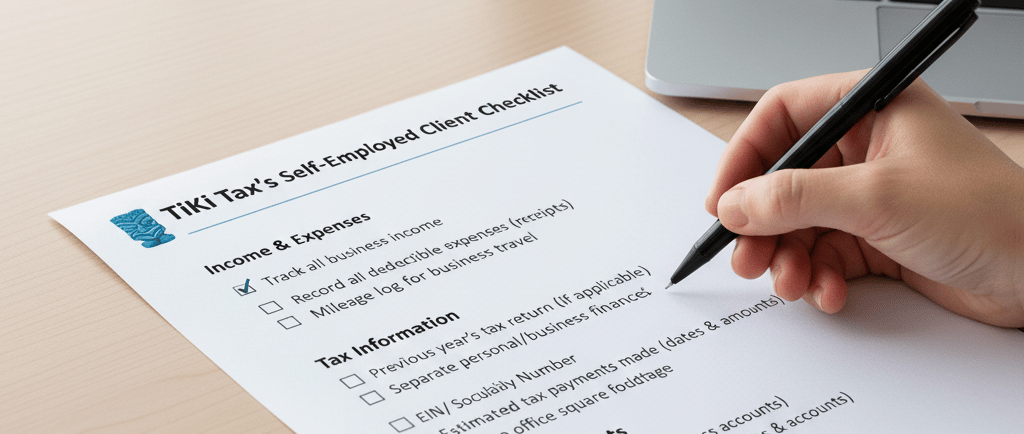new clients - Students/seniors $35 - Corp tax filing starts $800 - install app
TiKi Tax’s Self-Employed Client Checklist: What You Need Before Filing Taxes
Get ready for tax season with TiKi Tax’s Self-Employed Client Checklist — a simple guide to help freelancers and business owners gather everything needed for accurate, stress-free tax filing.
10/14/20252 min read


1. Why a Self-Employed Tax Checklist Matters
If you’re self-employed in Canada, you already know how complex taxes can get — from tracking income and expenses to claiming deductions properly. Missing even one document could cost you valuable credits or trigger CRA follow-ups.
That’s why TiKi Tax created this Self-Employed Client Checklist — a clear, step-by-step guide to make sure you’re prepared for tax season. Whether you’re a freelancer, consultant, or small business owner, this list keeps your paperwork organized and your filing stress-free.
2. Income Documents You’ll Need
Gather all proof of income before meeting your tax preparer or filing online.
Here’s what to include:
Invoices and receipts for all services provided.
Bank statements showing business deposits.
T4A slips (if you received contract income).
Sales summaries from platforms like PayPal, Stripe, or Etsy.
Rental or investment income if applicable.
💡 Tip: Keep digital copies of invoices in a single folder named by year (e.g., “Income 2024”) — it saves hours of searching later.
3. Expense Records to Prepare
As a self-employed individual, you can deduct business expenses to lower your taxable income. Make sure you have receipts for:
Office supplies and software (printers, accounting apps, etc.)
Internet and phone bills (partial use if working from home)
Vehicle expenses (gas, insurance, maintenance, mileage log)
Advertising and marketing costs (website, business cards, promotions)
Professional fees (legal, accounting, subcontractors)
💡 Tip: Always separate your personal and business expenses. Having a dedicated business bank account makes tax filing smoother.
4. Home Office Deductions
If you work from home, you may qualify for home office deductions. Keep these details ready:
Square footage of your workspace vs. total home size
Rent or mortgage interest
Utilities (electricity, heating, water)
Home insurance and property taxes
💡 Tip: TiKi Tax experts can help you calculate the right portion to claim — maximizing your deductions while staying compliant with CRA rules.
5. Vehicle and Travel Expenses
If you use your vehicle for business, you’ll need:
A mileage log (start and end odometer readings, purpose of each trip)
Receipts for gas, parking, and maintenance
Lease or purchase documents
For travel, keep invoices for flights, accommodations, and meals — only if directly related to business.
6. Other Important Documents
Don’t forget these extras that could affect your taxes:
Last year’s tax return (helps compare and avoid missed deductions)
CRA correspondence or installment payments
Business license or registration documents
GST/HST returns (if registered)
7. Let TiKi Tax Handle the Rest
Preparing your own taxes can be overwhelming — especially when you’re running your business full-time. At TiKi Tax, we simplify the process for self-employed Canadians by:
✅ Reviewing all your documents and deductions
✅ Ensuring compliance with CRA guidelines
✅ Maximizing your tax return or reducing what you owe
Upload your files securely, and our expert tax team will take care of the rest — fast, accurate, and stress-free.
📋 Final Checklist Summary
Before filing, make sure you have:
All income records (invoices, bank statements, T4A)
Receipts for business expenses
Home office and vehicle details
Last year’s return & CRA notices
Start Your Tax Filing the Smart Way
Don’t wait until the last minute. Use TiKi Tax’s Self-Employed Client Checklist today and get peace of mind knowing your taxes are 100% ready.
Services
Personalized tax preparation and consulting for all.
Location:
Support
email: info@tikitax.com
Phone:(+1).236.788.7799
© 2024. All rights reserved.
2339 HW 97, Kelowna, BC, Canada
145 Chadwick Ct Suite 220, North Vancouver, BC V7M 3K1
